 Jack Swab, University of Kentucky
Jack Swab, University of Kentucky
Jack Swab (he/him) is a Ph.D. student in Geography at the University of Kentucky and is the outgoing AAG Student Councilor. His dissertation research examines the role of local boundaries in the construction of public health maps, with an eye towards understanding their effectiveness. He has been an AAG member since 2015, and is looking forward to sharing his AAG experience with other students and young professionals.
 Amina Naliaka, Southern Illinois University, Carbondale
Amina Naliaka, Southern Illinois University, Carbondale
Amina Naliaka is a Ph.D. student in the Environmental Resources and Policy program at Southern Illinois University, Carbondale. Her research is focused on improving the understanding of groundwater sustainability in a changing climate from a coupled human-nature system perspective. She is currently serving as an intern with the AAG supporting the summer series 2022.
 Ali Alruzuq, University of Florida
Ali Alruzuq, University of Florida
Ali Alruzuq is a graduate student at the University of Florida in the Department of Geography and the Department of Civil Engineering. Ali is interested in Geographic Information systems (GIS), Remote Sensing (RS), Unmanned Aerial Systems (UAS), hydrology, geomorphology, sustainability, socioeconomic impacts, natural resources, and natural hazards and disasters, particularly under the circumstances of climate change. His Ph.D. research is focused on understanding how anthropogenic activities can influence a geographical area using Geospatial Artificial Intelligence (GeoAI) and other advanced methods.
